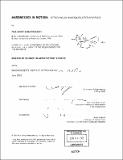Hardness in motion : retrieving Johannesburg after Apartheid
Author(s)
Schlapobersky, Paul Harry, 1966-
DownloadFull printable version (22.94Mb)
Other Contributors
Massachusetts Institute of Technology. Dept. of Architecture.
Advisor
Ann Pendleton-Jullian.
Terms of use
Metadata
Show full item recordAbstract
This thesis seeks to engage with the city of Johannesburg on terms that break decisively with the linear-historical methods that have been used to both catalogue and decipher the city up to the present. The city is, itself, in its second incarnation - that of the post-apartheid, post-gold mining metropolis - and the fact of this historic overturning demands reappraisal of what Johannesburg is, and more importantly, what it can become. Its complexities stand in stark opposition to an apparent banality that arises from the ease with which it is visually apprehended. Words form a core of this thesis, used not only in their capacity to reveal through what they say, but through the possibilities created in the spaces between unrelated and related texts (what they do not say). The thesis has thus been concerned with the juxtaposition of words - fiction and non· fiction - as well as their mapping and diagramming, in order to foster new conceptualizations of a city whose blatancy is simultaneously its lifeblood and its problem. The generative words in this context have been those of the thirteen fictions written specifically for the thesis. These stand as a representation of the creative act that is here seen as being fundamental to the re-imagining of Johannesburg; to get beyond the image/face of the city in order to view the human substrata. Additionally, two architectural "provocations" are offered as vehicles for ways in which the city can begin to be re ·imagined . Both of these projects engage with the idea of "absorption" (removal from contingency, to focus on transcendental endeavors), and the notion of the architectural project as a generator, not specifically for what it is, but for what it represents. These architectural projects are, within the context of t he thesis, Brecht's "fragile instruments".
Description
Thesis (S.M.)--Massachusetts Institute of Technology, Dept. of Architecture, 2002. Includes bibliographical references (p. 91-92).
Date issued
2002Department
Massachusetts Institute of Technology. Department of ArchitecturePublisher
Massachusetts Institute of Technology
Keywords
Architecture.